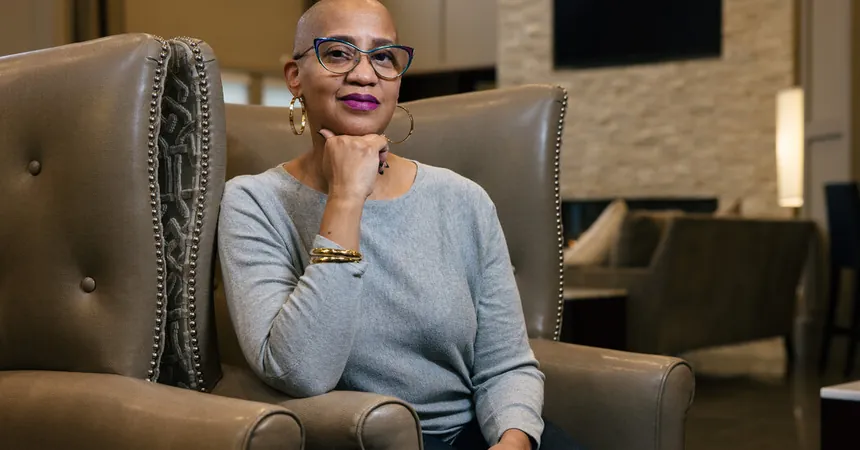
Surge in ADHD Diagnoses Among Older Adults: A Revealing Shift in Mental Health Awareness
2024-12-11
Author: Yan
Introduction
In recent years, an astonishing rise in ADHD (Attention Deficit Hyperactivity Disorder) diagnoses among older adults has captured the attention of mental health professionals. This trend is largely attributed to changing perceptions of mental health and increased accessibility through telemedicine.
A Personal Story: Tanya Murphy
Take the story of Tanya Murphy, a 56-year-old woman from Arlington, VA. Throughout her life, Tanya grappled silently with her depression, influenced by the prevailing stigma surrounding mental health in her Christian community in Georgia. 'God forbid you have a mental health issue,' she recalls. Yet, by her late 40s, Tanya could no longer hide her struggles with anxiety and feelings of worthlessness.
After researching her symptoms online, Tanya found that her childhood difficulties in focusing might stem from ADHD. Finally diagnosed at 53, she began treatment with Strattera, a non-stimulant medication, coupled with therapy and meditation. The transformation was palpable. 'I cried with joy,' she expresses. 'I finally understood that I wasn’t broken or lazy.'
Statistics on ADHD Diagnoses
An analysis by Truveta, revealing a staggering 61% rise in first-time ADHD diagnoses among people aged 30-44 and a 64% increase in the 45-64 age bracket, has underscored this shift. The statistics show that a remarkable 31% of first-time diagnoses are now among individuals ages 30 to 44, signaling a significant change in the demographic landscape.
Public Perception and Self-Diagnosis
A recent survey by Ohio State University Wexner Medical Center found that 25% of adults believe they have undiagnosed ADHD. Despite this, ADHD is estimated to occur in only 6% of the U.S. population. The proliferation of social media content discussing ADHD—TikTok alone hosts 3.7 million posts tagged with #ADHD—has fostered greater self-awareness and prompted many to seek diagnoses, particularly women, who face a higher likelihood of being diagnosed as adults.
Impact of Hormonal Changes and Stressors
The CDC indicates that 61% of women with ADHD find out about their condition when they’re adults, often exacerbated by hormonal changes associated with menopause. Moreover, everyday stressors, notably the COVID-19 pandemic, have cultivated a fertile ground for revealing previously unrecognized symptoms.
Another Experience: Kyle Lampe
Kyle Lampe, diagnosed at 46, resonates with this experience. He found himself identifying with ADHD concepts through social media, recalling his own tendencies to fidget and interrupt during class as a child. The journey to diagnosis led him to reflect on how his life—his friendships, career, and self-perception—might have differed had he been diagnosed earlier.
Concerns About Misdiagnosis
Despite the surge in diagnoses, experts caution that while many new cases are legitimate, the rise of online self-assessment tools can complicate the landscape. Stephen P. Hinshaw from UC Berkeley emphasizes the need for established clinical guidelines, echoing concerns about potential misdiagnoses from quick online evaluations.
The Experience of Dolores Brown
Dolores Brown, a 46-year-old resident of Milwaukee, found her ADHD diagnosis brought a sense of relief after years of feeling 'just crazy.' Initially diagnosed with bipolar disorder, her experience highlights the importance of thorough evaluations in mental health care.
Conclusion
This unprecedented surge in ADHD diagnoses among older adults marks a significant cultural shift in understanding mental health. As stigma continues to diminish and awareness broadens, the narrative surrounding ADHD and mental health is evolving, creating a more inclusive dialogue for those who have long struggled in silence.




 Brasil (PT)
Brasil (PT)
 Canada (EN)
Canada (EN)
 Chile (ES)
Chile (ES)
 España (ES)
España (ES)
 France (FR)
France (FR)
 Hong Kong (EN)
Hong Kong (EN)
 Italia (IT)
Italia (IT)
 日本 (JA)
日本 (JA)
 Magyarország (HU)
Magyarország (HU)
 Norge (NO)
Norge (NO)
 Polska (PL)
Polska (PL)
 Schweiz (DE)
Schweiz (DE)
 Singapore (EN)
Singapore (EN)
 Sverige (SV)
Sverige (SV)
 Suomi (FI)
Suomi (FI)
 Türkiye (TR)
Türkiye (TR)